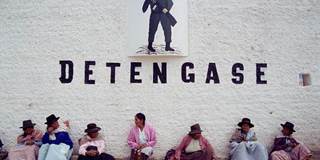Across Latin America, voters who, until recently, were enthusiastic about their leftist governments seem to be having a change of heart. But if voters are now jettisoning the left and its supposedly “pro-people” policies, it is not because they now prefer the “class enemy.”
LIMA – Across Latin America, voters who, until recently, were enthusiastic about their leftist governments seem to be having a change of heart. In Brazil and Venezuela, voters want to oust their leaders. In Argentina, they already have. In Bolivia, voters rejected President Evo Morales’s effort to amend the constitution so that he could seek another presidential term. And in Peru, no left-wing candidate made it into the second round of the presidential election, to be held on June 5.
But learning from experience is much trickier than it seems. We cannot relive the past; we can only tell stories about it – and the stories we tell tend to have a rather loose relationship with what really happened. Nowhere is that more true than in Latin America.
The narrative espoused by the region’s recent leftist leaders – particularly Brazil’s Luiz Inácio Lula da Silva, Venezuela’s Hugo Chávez, and Argentina’s Cristina Kirchner – was based on a revamped class struggle between “the people” and what could be called the “anti-people.” The policies that preceded theirs were said to be pro-rich, because the governments that pursued them were subservient to the rich. Their own popular movements supposedly rebelled against a political structure – local elites often in bed with imperialism (meaning mainly the United States) – that protected the interests of the anti-people.

LIMA – Across Latin America, voters who, until recently, were enthusiastic about their leftist governments seem to be having a change of heart. In Brazil and Venezuela, voters want to oust their leaders. In Argentina, they already have. In Bolivia, voters rejected President Evo Morales’s effort to amend the constitution so that he could seek another presidential term. And in Peru, no left-wing candidate made it into the second round of the presidential election, to be held on June 5.
But learning from experience is much trickier than it seems. We cannot relive the past; we can only tell stories about it – and the stories we tell tend to have a rather loose relationship with what really happened. Nowhere is that more true than in Latin America.
The narrative espoused by the region’s recent leftist leaders – particularly Brazil’s Luiz Inácio Lula da Silva, Venezuela’s Hugo Chávez, and Argentina’s Cristina Kirchner – was based on a revamped class struggle between “the people” and what could be called the “anti-people.” The policies that preceded theirs were said to be pro-rich, because the governments that pursued them were subservient to the rich. Their own popular movements supposedly rebelled against a political structure – local elites often in bed with imperialism (meaning mainly the United States) – that protected the interests of the anti-people.